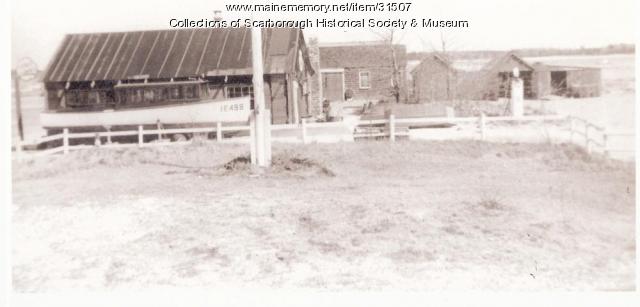Keywords: Boats and boating
Item 100440
Boats at Norcross Wharf, Norcross, ca. 1915
Contributed by: Norcross Heritage Trust Date: circa 1915 Location: Indian Purchase Township No. 3 Media: Photographic print
Item 101157
Boats at Norcross Wharf, North Twin Lake, ca. 1925
Contributed by: Norcross Heritage Trust Date: circa 1925 Location: Indian Purchase Township No. 3 Media: Photographic print
Item 86862
Fish House and Boat Shop, Portland Pier, Portland, 1924
Owner in 1924: Proprietors of Portland Pier Use: Fish House and Boat Shop
Item 86108
378-380 Commercial Street, Portland, 1924
Owner in 1924: Boston and Maine Railroad Use: Boat Shop
Item 151349
Contributed by: Maine Historical Society Date: 1895 Location: Portland Client: unknown Architect: John Calvin Stevens
Exhibit
Jameson & Wotton Wharf, Friendship
Since 1897, the Jameson & Wotton Wharf in Friendship has been an important addition to the community on Muscongus Bay. The wharf, which is accessible at all tides, was a steamboat stop for many years, as well as important to the lobster business.
Exhibit
For one hundred years, Acadia National Park has captured the American imagination and stood as the most recognizable symbol of Maine’s important natural history and identity. This exhibit highlights Maine Memory content relating to Acadia and Mount Desert Island.
Site Page
"These boats were after cod and haddock, the only marketable fish at the time. The market for salt fish expanded in 1800, leading more settlers to…"
Site Page
Scarborough: They Called It Owascoag - Maritime Tales: Shipyards and Shipwrecks - Page 1 of 2
"The shipyard and the seaport ceased to exist. Boat Building: Lobster Boats and Skiffs Dory with Twin Girls, Scarborough, ca."
Story
Bunkers and Lodges
by Bob Martin & Emily Holdtman Martin
Growing up in Maine, summering in Maine, and how it's changed.
Story
The Joys of Kayaking - Pam's Story
by Pam Ferris-Olson
Pam has kayaked in many special places but her fondest memories are being made on Casco Bay
Lesson Plan
Primary Sources: The Maine Shipyard
Grade Level: 9-12
Content Area: Social Studies
This lesson plan will give students a close-up look at historical operations behind Maine's famed shipbuilding and shipping industries. Students will examine primary sources including letters, bills of lading, images, and objects, and draw informed hypotheses about the evolution of the seafaring industry and its impact on Maine’s communities over time.
Lesson Plan
Becoming Maine: The District of Maine's Coastal Economy
Grade Level: 3-5
Content Area: Social Studies
This lesson plan will introduce students to the maritime economy of Maine prior to statehood and to the Coasting Law that impacted the separation debate. Students will examine primary documents, take part in an activity that will put the Coasting Law in the context of late 18th century – early 19th century New England, and learn about how the Embargo Act of 1807 affected Maine in the decades leading to statehood.



















